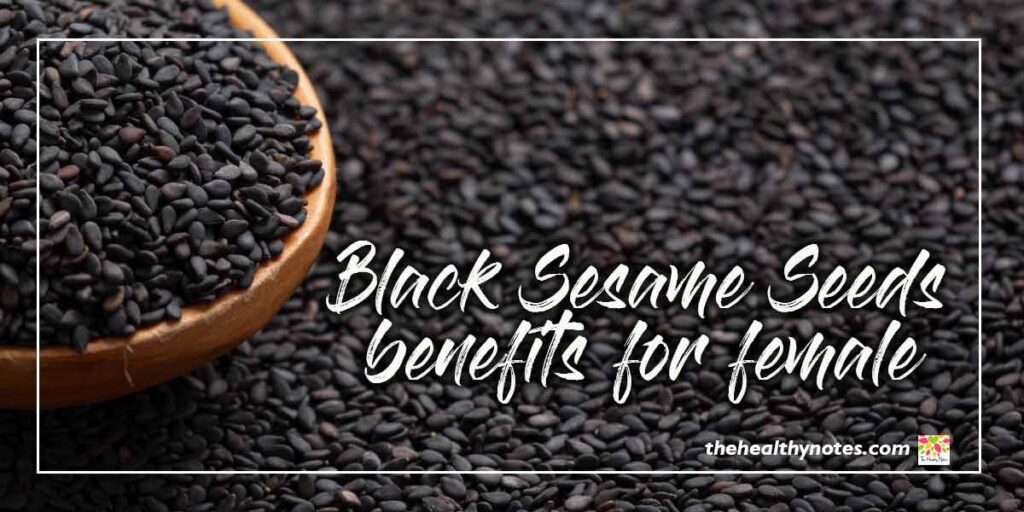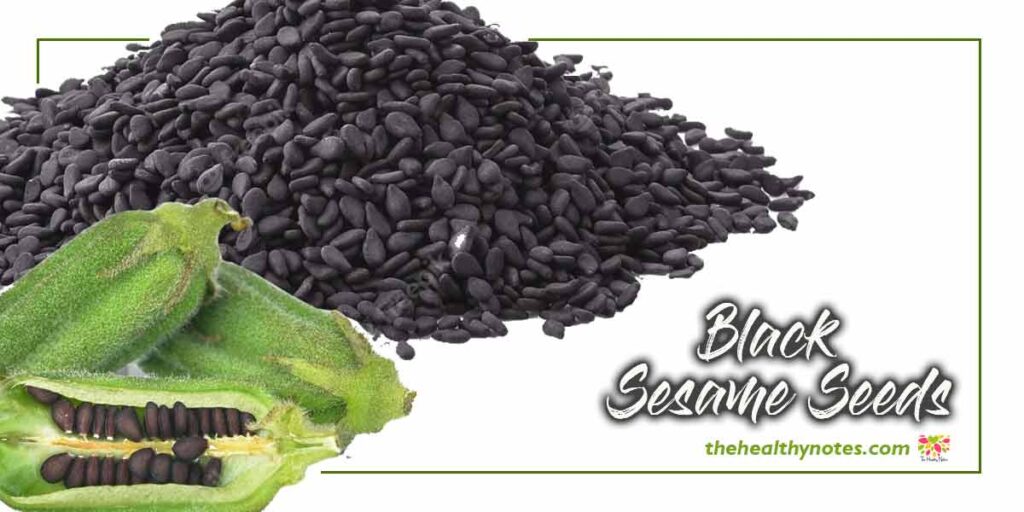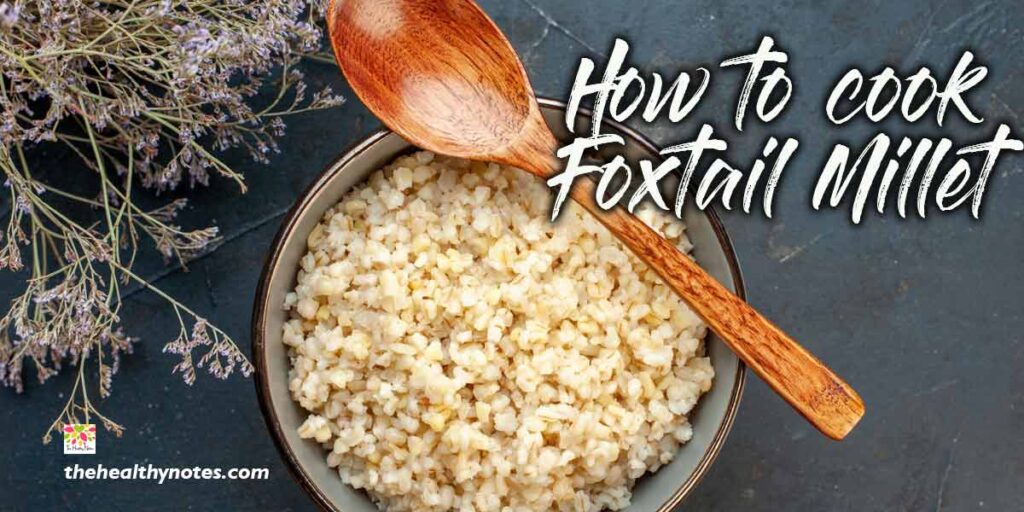
Black sesame seeds (to know all about seasme seeds: CLICK HERE) have been consumed for their potential health benefits for centuries, and they are often considered beneficial for both men and women. While some of the benefits are not specific to females, there are 22 amazing potential advantages that may be particularly relevant to female’s health:
Black Sesame Seeds Benefits for female
1. Iron Source:
These seeds are a good source of iron, which is important for female, especially during menstruation and pregnancy, to prevent iron-deficiency anemia.
2. Calcium for Bone Health:
Calcium in black sesame seeds helps maintain strong bones, reducing the risk of osteoporosis, a condition more common in female.
3. Hormonal Balance:
While scientific evidence is limited, some traditional medicine systems suggest that these seeds may help balance hormones in females.
4. Antioxidant Properties:
The antioxidants in black sesame seeds can protect cells from oxidative damage, potentially reducing the risk of chronic diseases.
5. Heart Health:
Healthy fats in these seeds may help lower bad cholesterol levels, reducing the risk of heart disease, which is a leading cause of death in females.
6. Skin Health:
Antioxidants in these seeds can promote healthy skin and protect against premature aging.
7. Hair Health:
Nutrients like iron and zinc in these seeds may contribute to shinier and stronger hair, which is important for many females.
8. Digestive Health:
The fiber in these seeds can aid digestion and promote a healthy gut, reducing digestive discomfort.
9. Menstrual Health:
Black sesame seeds provide essential nutrients like iron, helping combat fatigue and iron deficiency during menstruation.
10. Postmenopausal Health:
For women postmenopause, calcium and other nutrients in black sesame seeds support overall health and bone density.
11. Reduction in Inflammation:
Some studies suggest that compounds in black sesame seeds may have anti-inflammatory properties, which can benefit females dealing with inflammatory conditions.
12. Mental Well-being:
A nutrient-dense diet, including black sesame seeds, can contribute to overall health and well-being, which is particularly important for female’s mental health.
13. Folate Content:
Black sesame seeds contain folate (vitamin B9), which is important for women of childbearing age as it helps prevent neural tube defects in newborns.
14. Weight Management:
The fiber and healthy fats in black sesame seeds can promote feelings of fullness and aid in weight management, which is a concern for many females.
15. Reduced PMS Symptoms:
Some women find relief from common premenstrual syndrome (PMS) symptoms like bloating and mood swings by incorporating nutrient-rich foods like black sesame seeds into their diet.
16. Anti-Aging Properties:
Antioxidants in black sesame seeds can help protect skin from UV damage and reduce the appearance of fine lines and wrinkles.
17. Enhanced Immunity:
The nutrients in black sesame seeds, such as zinc and iron, support a healthy immune system, which is important for females’s overall health.
18. Energy Boost:
Iron in black sesame seeds can help combat fatigue and boost energy levels, which can be particularly beneficial for females with busy lifestyles.
19. Lowered Risk of Anemia:
Regular consumption of black sesame seeds may reduce the risk of iron-deficiency anemia, a common issue among females.
20. Improved Mood:
The nutrients in black sesame seeds, including B vitamins, may help stabilize mood and reduce symptoms of depression and anxiety.
21. Healthy Pregnancy:
Black sesame seeds can provide essential nutrients like folate and iron, which are crucial for a healthy pregnancy and fetal development.
22. Reduced Risk of Breast Cancer:
While more research is needed, some studies have suggested that sesame seeds, including black sesame seeds, may have compounds that could reduce the risk of breast cancer in women.
Remember that while these seeds have numerous potential benefits, they should be part of a well-balanced diet. Additionally, individual dietary needs and responses can vary, so it’s advisable to consult with a healthcare professional or nutritionist for personalized dietary recommendations.

How to use Black Sesame Seeds?
You can use these seeds in many yummy ways. Sprinkle them on salads, toast them for a crunchy topping on soups and veggies, blend them into smoothies, or mix them into your baking like muffins or cookies. You can also make tasty dips, sauces, and dressings with them. Don’t forget to try them in Asian noodles or on top of your morning yogurt or oatmeal. Just use them in moderation because they’re a bit calorie-heavy but packed with good nutrients!
Black Sesame Seeds Nutrition Facts
Here are the approximate nutrition facts for black sesame seeds per 1 tablespoon (about 9 grams) serving:
Calories: 51 calories
Protein: 1.6 grams
Total Fat: 4.5 grams
Saturated Fat: 0.6 grams
Monounsaturated Fat: 1.3 grams
Polyunsaturated Fat: 2.2 grams
Carbohydrates: 1.7 grams
Dietary Fiber: 1.0 gram
Sugars: 0 grams
Calcium: 18 milligrams (2% of the Daily Value, DV)
Iron: 1.1 milligrams (6% of DV)
Magnesium: 27 milligrams (7% of DV)
Phosphorus: 48 milligrams (5% of DV)
Zinc: 0.6 milligrams (4% of DV)
Potassium: 51 milligrams (1% of DV)
Folate (Vitamin B9): 7 micrograms (2% of DV)
Vitamin B1 (Thiamin): 0.1 milligrams (7% of DV)
Vitamin B3 (Niacin): 0.4 milligrams (2% of DV)
Vitamin B6: 0.0 milligrams (2% of DV)
Please note that these values are approximate and can vary slightly depending on the source and processing of the black sesame seeds. These seeds are a nutrient-dense food, particularly rich in calcium, iron, magnesium, and healthy fats. They are also a good source of protein and dietary fiber, making them a valuable addition to a balanced diet.
IMPORTANT
Approximately 1.1 million individuals in the United States are affected by sesame allergies, and among children who have other food allergies, 17% also have a sesame allergy.
Starting from January 1, 2023, federal regulations mandate that sesame must be clearly labeled as an allergen on packaged foods, including dietary supplements.
Sesame is now officially recognized as one of the nine major food allergens under federal law, joining the following:
Milk, Eggs, Fish (e.g., bass, flounder, cod), Crustacean shellfish (e.g., crab, lobster, shrimp), Tree nuts (e.g., almonds, walnuts, pecans), Peanuts, Wheat, Soybeans,Sesame
The Food and Agriculture Organization of the United Nations reports that, from 1994 to 2021, the following countries ranked among the top producers of sesame seeds:
Sudan, India, China, Myanmar, Tanzania, Nigeria, South Sudan, Ethiopia
Uganda
You may like also:


4 thoughts on “22 Black Sesame Seeds Benefits for Female”